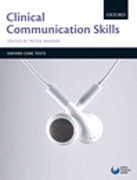
Clinical communication has been formally taught to medical students in the first few years of their course for several years, but it is only in relatively recent times that clinical communication has become routinely assessed. Increasingly, students recognise the fact that their 'general' communication skills do not automatically translate into effective clinical communication. This textbook reflects the shifts described above and presents the medical student with a compelling resource in a field which has come of age. Clinical Communication Skills is designed to be the first textbook of choice for lecturers and students alike, for early use in the medical degree. The book recognises that this subject is often taught in parallel with Clinical Skills, and makes appropriate links. The book is unapologetically practical in its remit - it aims to equip students to deal with all kinds of clinical encounters, and to optimise the ways in which they communicate with patients and colleagues. Coverage features written communication, and also includes presenting patients to colleagues.Importantly, the book draws on patient and service-user involvement as well as a range of professional views. Readers can listen to these original interviews which are available as podcasts on the book's Online Resource Centre. Extracts from these interviews are woven into the text of the book, and are designed in a second colour for ease of reference. Similarly, sample conversational script is printed in colour so that students can easily scan for examples of positive communication. However, a pragmatic approach is taken; coverage of whatto do when things go wrong is also provided. Clinical Communication Skills assumes no prior knowledge, but the communication challenges which the book addresses do advance throughout the chapters. The book starts with the basics of why clinical communication is taught, the process of the medical interview, andtaking a medical history. The middle section of the book covers how to talk with other professionals, to a diverse range of patients, to children and youngpeople, and to people with mental health problems. The final section of the book covers information-giving skills which have become more prominent across medicine, including managing uncertainty, explaining risk, patient safety, dealing with complaints and breaking bad news. The material is written to apply toa range of settings, not limiting itself to general practice.
- ISBN: 978-0-19-955046-3
- Editorial: Oxford University
- Encuadernacion: Rústica
- Páginas: 160
- Fecha Publicación: 01/04/2009
- Nº Volúmenes: 1
- Idioma: Inglés
